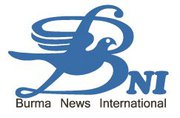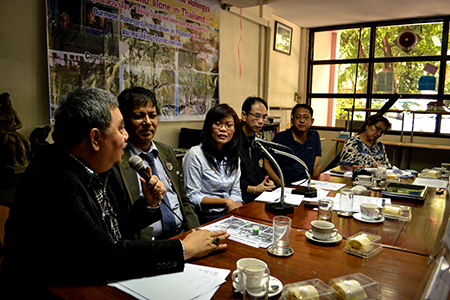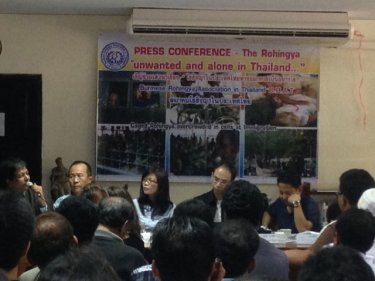
|
Sunday, September 1, 2013 Phuket time: 1:41 AM
|
|
 |
Ketsarin Tiawsakul, director of the HRC’s human rights infringement investigation office. Photo: Ketsarin Tiawsakul / Facebook
|
PHUKET:
The National Human Rights Commission of Thailand (NHRC) yesterday
confirmed that the report on the case of the Royal Thai Navy opening
fire on Rohingya refugees off the coast of Ranong in February, will be
concluded this month.
During the shooting, naval personnel allegedly killed at least two refugees fleeing arrest.
The report will be handed over to Prime Minister Yingluck Shinawatra “as soon as possible”, the Phuket Gazette was told.
“Our investigation concerning the allegation of the Royal Thai Navy killing at least two Rohingya will be concluded soon. We’re endeavoring to finish it by the middle of September,” Dr Nirun Phitakwatchara of the National Human Rights Commission of Thailand (NHRC) confirmed to the Gazette.
Five months ago, PM Yingluck vowed in front of the international press that the incident would be investigated (story here). Since then, however, details of the investigation process have not been revealed and no deadline has been set for the completion of the investigation.
“We are now working on putting all the evidence and information together in the report that will be handed over to PM Yingluck, in the interests of resolving the whole Rohingya issue in Thailand,” said Dr Nirun.
“In addition to the alleged killings, other issues have been included in the report, including the overcrowded conditions of Rohingya refugees in Thailand’s refugee shelters, the manner in which they are treated, and what country or countries they will eventually be transferred to,” he said.
“It has taken a long time to conclude the report because the Rohingya refugee issue is a big one and has many dimensions. We have sent our staff to a number of locations to collect as much information as possible for our investigation, in order to build up a dossier comprehensive enough to be handed over to the Prime Minister.”
Dr Nirun disclosed that suggestions to solve problems related to the Rohingya-refugee influx will be included in the report, but cautioned that he could not disclose any of these suggestions at present because the investigation is still incomplete.
However, Dr Nirun did clearly state: “We are not trying to interfere with any national authority or apportion blame, especially towards the navy.
“Policies need to be made to prepare for the problem we are facing, mindful that many more Rohingya refugees will be arriving on our shores. We don’t want this to become a chronic problem for Thailand.”
During the shooting, naval personnel allegedly killed at least two refugees fleeing arrest.
The report will be handed over to Prime Minister Yingluck Shinawatra “as soon as possible”, the Phuket Gazette was told.
“Our investigation concerning the allegation of the Royal Thai Navy killing at least two Rohingya will be concluded soon. We’re endeavoring to finish it by the middle of September,” Dr Nirun Phitakwatchara of the National Human Rights Commission of Thailand (NHRC) confirmed to the Gazette.
Five months ago, PM Yingluck vowed in front of the international press that the incident would be investigated (story here). Since then, however, details of the investigation process have not been revealed and no deadline has been set for the completion of the investigation.
“We are now working on putting all the evidence and information together in the report that will be handed over to PM Yingluck, in the interests of resolving the whole Rohingya issue in Thailand,” said Dr Nirun.
“In addition to the alleged killings, other issues have been included in the report, including the overcrowded conditions of Rohingya refugees in Thailand’s refugee shelters, the manner in which they are treated, and what country or countries they will eventually be transferred to,” he said.
“It has taken a long time to conclude the report because the Rohingya refugee issue is a big one and has many dimensions. We have sent our staff to a number of locations to collect as much information as possible for our investigation, in order to build up a dossier comprehensive enough to be handed over to the Prime Minister.”
Dr Nirun disclosed that suggestions to solve problems related to the Rohingya-refugee influx will be included in the report, but cautioned that he could not disclose any of these suggestions at present because the investigation is still incomplete.
However, Dr Nirun did clearly state: “We are not trying to interfere with any national authority or apportion blame, especially towards the navy.
“This is not just a national issue, it is a global one. The issue needs to be solved by several government departments working in the same direction.
“Policies need to be made to prepare for the problem we are facing, mindful that many more Rohingya refugees will be arriving on our shores. We don’t want this to become a chronic problem for Thailand.”
|




 Panel speakers at the press conference in Bangkok
Panel speakers at the press conference in Bangkok.jpg)


 Immigration police and provincial officers recaptured only six of
17 illegal Rohingya migrants that escaped immigration custody in Rayong
where they’d been kept for more than six months.
Immigration police and provincial officers recaptured only six of
17 illegal Rohingya migrants that escaped immigration custody in Rayong
where they’d been kept for more than six months.














